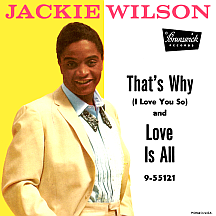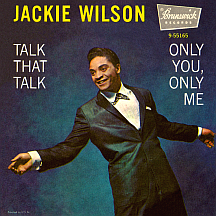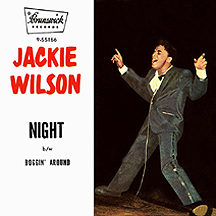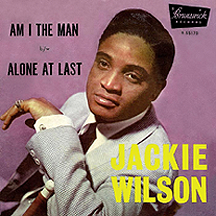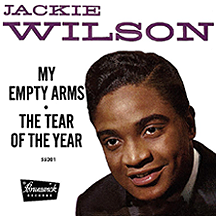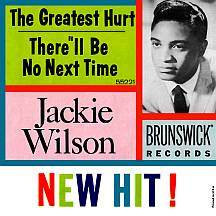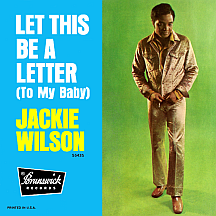JACKIE WILSON
When "Mr. Excitement" performed, the audience was his to command...at least the women who made up the majority of it were. Jackie Wilson had full confidence in his ability to stimulate his female fans past the point of logical control. Always dressed in the sharpest suits, with his coat over one shoulder, tie loosened, sweat popping, he would float across the stage, make a well-timed 360 degree spin and then drop to his knees, often doing a split right down to the floor, with a fluid movement that would promptly have him standing again. Then he'd repeat the moves, often leaning into the front row to kiss the girls, giving them hope for an encounter that was not necessarily out of the question. You could say Jackie rolled up the most appealing attributes of the era's top singers into one: he was more of a "pretty boy" than James Brown, had more sex appeal than Little Richard and more impressive stage moves than Sam Cooke. Whether or not these statements were the unexaggerated truth didn't matter; he was all this and more to millions of fans and his continuous success for more than a decade justified the high-and-mighty nickname. If only, along the way, he'd made the money he deserved!
Wilson grew up in Highland Park, Michigan and sang in a local quartet, The Ever Ready Gospel Singers, as a teenager. He began boxing in 1950, at age 16; competing in Golden Gloves tournaments, he quickly realized it was not his calling (he won two bouts and lost eight). Shifting his focus to music at his mother's insistence, he joined The 4 Falcons (which briefly featured eventual Four Tops leader Levi Stubbs) before catching the eye of Johnny Otis, who set him up in a short-lived R&B group called The Thrillers. His first shot at making a record came with Dizzy Gillespie's Dee Gee Records in 1952. Headquartered in Detroit, the label released "The Rainy Day Blues" with Jackie billing himself as Sonny Wilson (a nickname from childhood) and featuring Billy Mitchell, a saxophonist and member of Gillespie's band at the time. "Danny Boy," his second and final Dee Gee single, showed a dramatic flair the young singer had for emotional ballads, though he sorely need to refine his style.
There were no less than three significant people in Jackie's career...some good, at least one bad. Billy Ward was one of the good ones. When Clyde McPhatter left Ward's group The Dominoes before starting The Drifters, Ward contacted Wilson and offered him the job, then changed his name from Sonny back to Jackie. The young singer's vocal ability and stage moves were similar to those of McPhatter; Ward groomed him for stardom during the singer's three years with the group. Wilson was boldly overconfident, which made it all the more difficult for Billy to bust through that ego and actually get him to the next level, but gradually Jackie's technique improved.
Some 20 Dominoes sides on the Cincinnati-based Federal label featured Wilson's vocals. Most were unsuccessful, though the rough-edged "You Can't Keep a Good Man Down" and ballad "Rags to Riches" (the latter a cover of Tony Bennett's number one pop smash) were R&B hits in 1953. Later, Ward moved to Decca and scored a top 20 pop hit in the fall of '56 with "St. Therese of the Roses," featuring Jackie's lead vocal against an arrangement by Jack Pleis sounding more pop-oriented than any previous Dominoes recordings. The following year Wilson left the group, appearing live at the Flame Show Bar in Detroit while pursuing a solo recording deal. Flame Show manager Al Green helped him obtain a contract with Decca; the company placed him on subsidiary label Brunswick. Whether it was the best thing for him by today's perspective is a tricky judgment call.
Another of the good people in Wilson's life was Berry Gordy, Jr. In 1957 Gordy, also a former Golden Glover, was working every angle in attempts to wedge himself into the music business. He approached Green, who ran the Pearl Music Company in addition to the nightclub Jackie appeared at, and on a visit to the company's office one day he met Roquel "Billy" Davis (who composed songs under the pen name Tyran Carlo). Together they wrote "Reet Petite," which Gordy considered a "so-so song"...that is, until Jackie made it come alive. He let 'er rip on the uptempo, brass-injected track (''ooh, ah, ooh, ah, ooooh-wee!...R-r-r-r-Reet Petite, the finest girl you ever want to meet!'), a bolder production than usual for pop arranger Dick Jacobs. It was the first of many solo hits for Wilson...and, as a songwriter, for future Motown founder Gordy.
Al Green unexpectedly passed away at about this time. His assistant, Nat Tarnopol, took charge of Wilson's affairs, an unfortunate turn of events, as Tarnopol utimately proved to be working both for and against him. The Gordy-Davis team came up with "To Be Loved," an even bigger hit (featuring an understated arrangement by Milton DeLugg that highlighted Jackie's passionate vocals). "I'm Wanderin'" and "We Have Love" stumbled prior to the recording that launched him into the mainstream: "Lonely Teardrops," with Jacobs back as permanent arranger, had been conceived by Gordy and Davis as a blues ballad ('My heart is crying, crying...'), but the finished work was an upbeat, emotionally energetic, and danceable, track (making clever use of a 'Shoo-be-do-bop, bop, bop...' backing chorus). Reaching number one on the R&B charts in early 1959 (making it Gordy's, Davis's and Wilson's first time atop a national chart), the song was also the first top ten pop hit for each.
Two big hits followed in the early months of '59. "That's Why (I Love You So)" utilized the flute for a unique sound (an instrument Gordy continued using to notable effect on hit singles by Marv Johnson and many early Motown productions). The pop chorus background singers on many of Jackie's singles have been criticized over the years, yet the label's producers were clearly doing something right...the songs were hits! Gordy, in fact, liked the pop backgrounds, later producing Johnson's records with his own group, the similar-sounding Rayber Voices. Experimenting further, Jacobs (at Gordy's suggestion) had a uniquely catchy organ riff running throughout "I'll Be Satisfied," another huge hit. His ramped-up routines during onstage performances and on TV guest spots made the "Mr. Excitement" nickname an obvious one. With the higher profile came increased attention from adoring female fans, presenting temptation he didn't bother to resist that, as a result, put a strain on his marriage.
Gordy and Davis severed their association with Wilson in early '59, not because of any problems with the singer, but as a conscious decision following a dispute over royalties with Tarnopol (who, it turns out, was withholding the lion's share of monies earned); by this time Gordy felt he was ready to take control of his fate and get his own Tamla label going. Jackie appeared onscreen that summer singing "You Better Know It," which he'd written with Norm Henry, in the rock and roll film Go, Johnny, Go! (packed with performances by Chuck Berry, Jimmy Clanton, Ritchie Valens, The Cadillacs, The Flamingos, Eddie Cochran and other greats). In October, the song became his second number one R&B seller; Sid Wyche's "Talk That Talk" was a hit at the end of the year, the success of these post-Berry Gordy releases suggesting Wilson had the goods to sell records regardless of who wrote the songs.
In the early 1960s Jackie revealed a preference for an operatic style of pop singing, a difficult undertaking and one he proved he could pull off. "Night" was based on an excerpt of Camille Saint-Saens' "My Heart at Thy Sweet Voice" from the 1877 opera "Samson and Delilah," adapted by pop songwriters Johnny Lehmann and Herb Miller; the show-stopping aria became his all-time biggest hit in the spring of '60. The flip side, "Doggin' Around," a blues-infused number written by the mysterious Lena Agree, was a stronger hit in the rhythm and blues market, Jackie's third to reach number one. Then came "(You Were Made For) All My Love," a mock-operatic production composed by Jackie and Billy Myles that fooled everyone, backed with an ultra-soulful rendition of Wyche's "A Woman, a Lover, a Friend" that, like the previous B side, topped the R&B charts.
The pattern (classically-inspired song on one side, trendy R&B song on the flip) was used for the next two releases and, somewhat unexpectedly, worked like a charm. "Alone At Last" originated in 1875; Peter Tchaikovsky's "Piano Concerto in B Flat" had already been adapted as a pop instrumental by bandleader Freddy Martin and pianist Jack Fina (a number one hit in 1941), then several months later by Martin with vocalist Clyde Rogers as "Tonight We Love" featuring added lyrics by Bobby Worth. Wilson's top ten 1960 version retained Tchaikovsky's melody but had a completely different set of lyrics by Lehmann. B side "Am I the Man" bore no similarity; the Bob Hamilton-Tom King song, in Jackie's hands, was no less than a rhythmic scorcher.
Jackie challenged himself greatly with "My Empty Arms," which adapted the melody of "Vesti La Giubba" from the 1892 opera "I Pagliacci," famously recorded by Enrico Caruso in 1902 (a number one hit and early million seller for the master in '07). Lyrics in English were added by Al Kasha and Hank Hunter and the record was yet another top ten hit for Wilson in early 1961. Talk about a major departure from earlier R&B and pop recordings under the creative guidance of Billy Ward or Berry Gordy!
Later '61 hits were done in a more contemporary style: Joyce Lee's bluesy "Please Tell Me Why" and the bouncy "I'm Comin' on Back to You," a Kasha-Horace Ott song, each reached the top 20. A setback came in February when Jackie was shot by a "crazy chick" (as he called her), possibly a deranged fan, but more likely one of the many women he ran around with behind his wife's back. The bullet lodged very near his spine; he lost a kidney as a result and was sidelined for a time. From mid-'61 through the end of '62, single releases hit the charts with marginal results while Jackie recuperated. He then altered his course, performing in more upscale clubs than before including New York City's Copacabana, while releasing albums of pop standards and recording his first of two singles with recent discovery Linda Hopkins.
He had been composing songs for a couple of years with Alonzo Tucker, a close friend and former member of Hank Ballard's group The Midnighters. Their partnership reached a high note in the spring of '63 when "Baby Workout" returned him to top ten pop and number one R&B positions. The song combined a big band arrangement with a screamin', shoutin' vocal performance that was irresistible. Similarly energetic 45s followed, including "(Hey Hey Hey Hey) Dance Back to Me," credited to Dick Jacobs and his Orchestra with Friend (the entire vocal made up of Jackie's shouts, "heys" and hiccups), Bobby Adams and Bobby Stevenson's "Shake! Shake! Shake!" and other collaborations with Tucker: "Baby Get It (And Don't Quit It)," "Big Boss Line" and a fan-favorite ballad, "No Pity (In the Naked City)." In '66 he and LaVern Baker gave it a whirl with "Think Twice," but the duet went largely unnoticed. Nothing rose particulary high on the charts for a period of three years.
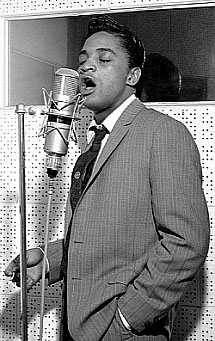
In 1966, Chicago soul mogul Carl Davis (producer of many hits for Gene Chandler, Major Lance and others) began working with Jackie; right off the bat, "Whispers" scored big, breaking the three year slump. Written by Barbara Acklin and David Scott, it was a departure from anything the singer had done to that point. Jackie recorded often at Davis's Windy City studio after that. Seasoned songwriters Gary Jackson and Carl Smith penned "(Your Love Keeps Lifting Me) Higher and Higher," giving Jackie another R&B chart-topper (his sixth) in fall '67 and nabbing him a second Grammy Award nomination in the category Best Rhythm and Blues Solo Vocal Performance, Male (his first, for "Lonely Teardrops," had come in 1960, an odd consolation of sorts considering the recording's eligibility period was technically the previous year). "Since You Showed Me How to Be Happy" and "I Get the Sweetest Feeling" also sold well into 1968. These hits brought renewed vigor to Wilson's career, assuring his place in the music world for years to come.
To those of us on the outside, he was a major star with a strong catalog of music. No one unacquainted with Wilson could have guessed at his poor state of finances; such a thing just didn't make sense. Yet Tarnopol, from the day he gained control, had taken advantage of the singer, doling out money to him while wantonly mismanaging his affairs. It didn't help that Jackie recklessly spent what he did receive, indulging in material possessions, giving little thought to the amount of alcohol and drugs he consumed or the women he yielded to in assembly-line fashion. The level of trust he had in his manager was unfounded, but it was the way business was done under Tarnopol during the many years he ran Brunswick Records. Other artists at the label were subjected to the same kinds of restrictions. Wilson, by far the company's biggest star, was most taken advantage of, as untold millions in revenue somehow never found its way into his personal bank account.
Though he made a number of interesting recordings after 1968, there were no more major hits. After an album of soul music remakes with legendary jazz bandleader Count Basie met with indifference, Wilson began working with Eugene Record, lead singer of The Chi-Lites, a hot late-'60s addition to the Brunswick roster. The two wrote songs together for the next few years, the lower-charting "Helpless" and "Let This Be a Letter (To My Baby)" among the better efforts. In early '71 "This Love is Real," by another set of Chicago-based songwriters, Johnny Moore and Jack Daniels, made some noise, landing him in the R&B top ten one final time.
In the early 1970s life became increasingly difficult for Wilson; his first marriage had long since ended due primarily to his infidelities. In 1970, after separating from his second wife, a tragic incident occurred when his son, Jackie Jr., was shot and killed near their Detroit home. Wilson had a hard time dealing with the incident, turning to a steady diet of drugs and booze in an attempt to ease the pain. As he sank deeper into depression, performance dates became rarer and were held in far less prestigious locations than before. He continued recording, often working with Carl Davis or Eugene Record (who, with the Chi-Lites, became a major soul star with chart-topping hits like "Have You Seen Her" and "Oh Girl"). During a September 1975 performance at the Latin Casino near Cherry Hill, New Jersey, Wilson collapsed onstage. Dick Clark, promoter of the tour, stopped the show and had him rushed to the nearest hospital, where he fell into a coma.
Nat Tarnopol and other Brunswick label executives were indicted on several charges of fraud at about that time; the court determined that a great deal of money was owed Wilson, though just how much was difficult to pin down, estimates running from one million to several times that. Everyone involved was convicted, but the ruling was later overturned on appeal. As incredible as it sounds, Tarnopol beat the rap. Meanwhile, Wilson spent several years in different hospitals, undergoing physical therapy and remaining in a partially-comatose state for much of the time. In 1977, his daughter Sandra died, but reasons why are unclear; one account claims it was a heart attack, yet she was only in her mid-twenties.
Jackie finally passed away in January 1984. Just 49 years old, his quality of life in those last eight-plus years was nil. Deeply in debt at the time of his passing, he was buried at Westlawn Cemetery in Detroit in an unmarked grave (an unthinkable wrong that has since been righted). Could there possibly be anything to worsen the tragedy of such an excruciatingly long, slow final phase of life? Unhappily, yes. Four years later, his daughter Jacqueline died in a drug-related incident. For Jackie and his family, nothing seemed to work out right.
What remains is his wonderful backlog of recordings. But does anyone care? Fortunately one very high-profile star (who, sadly, also died far too young) was a huge fan and told the world of his admiration for one of his idols. At the February 1984 Grammy Awards held several weeks after Wilson's death, Michael Jackson, upon accepting one of the eight awards received that evening for Thriller (the album's title rumored to be a tribute to Jackie, referencing his early group), made this comment: "Some people are great entertainers, some people are followers and some people make the path and are pioneers. I'd like to say Jackie Wilson was a wonderful entertainer. He's not with us anymore, but Jackie, where you are, I'd like to say I love you and thank you so much." The impact of these words greatly increased demand for Wilson's records, all but a few of which had been out of print for several years. Then in 1986, "Reet Petite" was reissued in England, reaching number one there at the end of the year and breaking big soon after in several other countries. In one instance, a concert promoter unaware the singer had passed away even tried to book him for some shows. He was a hot property once again. What goes around had, spectacularly, come around. And the greatness of Jackie Wilson was embraced by a new generation of music fans.
NOTABLE SINGLES:
- The Rainy Day Blues - 1952
as Sonny Wilson - Danny Boy - 1952
as Sonny Wilson - You Can't Keep a Good Man Down - 1953
by Billy Ward and his Dominoes - Rags to Riches - 1953
by Billy Ward and his Dominoes - St. Therese of the Roses - 1956
by Billy Ward and his Dominoes - Reet Petite - 1957
- To Be Loved - 1958
- We Have Love - 1958
- Lonely Teardrops - 1959
- That's Why (I Love You So) - 1959
- I'll Be Satisfied - 1959
- You Better Know It - 1959
- Talk That Talk - 1959
- Night /
Doggin' Around - 1960 - A Woman, a Lover, a Friend /
(You Were Made For) All My Love - 1960 - Alone At Last /
Am I the Man - 1960 - My Empty Arms /
The Tear of the Year - 1961 - Please Tell Me Why /
Your One and Only Love - 1961 - I'm Comin' on Back to You /
Lonely Life - 1961 - Years From Now /
You Don't Know What it Means - 1961 - The Way I Am /
My Heart Belongs to Only You - 1961 - The Greatest Hurt /
There'll Be No Next Time - 1962 - I Found Love - 1962
by Jackie Wilson and Linda Hopkins - Hearts - 1962
- I Just Can't Help It - 1962
- Forever and a Day - 1962
- Baby Workout - 1963
- (Hey Hey Hey Hey) Dance Back to Me - 1963
by Dick Jacobs and his Orchestra with Friend - Shake a Hand - 1963
by Jackie Wilson and Linda Hopkins - Shake! Shake! Shake! - 1963
- Baby Get It (And Don't Quit It) - 1963
- Big Boss Line - 1964
- Squeeze Her - Tease Her (But Love Her) - 1964
- Danny Boy - 1965
- No Pity (In the Naked City) - 1965
- Think Twice - 1966
by Jackie Wilson and LaVern Baker - Whispers (Gettin' Louder) - 1966
- (Your Love Keeps Lifting Me) Higher and Higher - 1967
- Since You Showed Me How to Be Happy - 1967
- For Your Precious Love - 1968
by Jackie Wilson and Count Basie - Chain Gang - 1968
by Jackie Wilson and Count Basie - I Get the Sweetest Feeling - 1968
- For Once in My Life - 1968
- Helpless - 1969
- Let This Be a Letter (To My Baby) - 1970
- This Love is Real - 1971


